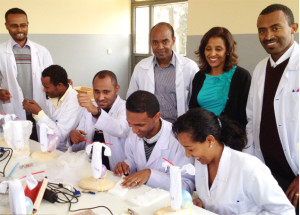A Michigan-based doctor has responded to comments by the health minister in her country of birth by helping to set up a training program to encourage medical graduates to practise at home rather than travel abroad.
Ethiopia’s health minister bemoaned the fact that there are more Ethiopian doctors in Chicago than in his own country in a 2011 address. Senait Fisseha, an associate professor of obstetrics and gynecology at the University of Michigan is leading an effort to develop a postgraduate training program for doctors of obstetrics and gynecology (OB-GYN) that is fast-becoming a national model for Ethiopia.
Fisseha said that University of Michigan has learned from its work in other African nations—especially Ghana—that one of the best ways to retain medical talent is to offer doctors training and other opportunities to advance their careers.
“People don’t want to leave their country if they have the option to stay there. Nobody wants to be a second-class citizen somewhere else,” Fisseha said.
Last year, Fisseha established a postgraduate OB-GYN training program at St. Paul’s Hospital in Ethiopia’s capital, Addis Ababa, with the help of Tim Johnson, chair of University of Michigan’s department of OB-GYN, and Joe Kolars, senior associate dean for Global REACH. Her work is funded by a $1.6 million grant from an anonymous foundation. She has received an additional $270,000 per year for the next five years from the Centers for Disease Control and Prevention and the American International Health Alliance.
When she began working at St. Paul’s, the hospital only had two OB-GYN doctors. One was an administrator and the other was the department chair, assisted by 16 midwives.
“They have about 250,000 visits per year and they do about 4,000 deliveries. That’s equivalent to what we do at University of Michigan,” Fisseha said. “But we have over 80 OB-GYN faculty, 24 residents and 25 fellows.”
When the OB-GYN training program started last year, seven residents were enrolled and 13 are taking part this year.
“Now, there are 200 OB-GYNs in the country with a 90-million population,” Fisseha said. “In four years, we will be able to contribute about 50 OB-GYNs. It’s a quarter of what the country has now. It’s a massive contribution.”
Postgraduate training programs are extremely rare in Ethiopia. After students earn their medical degrees as undergraduates, they’re sent out into the field as generalists, often working on their own with little supervision.
“They are the surgeons. They are the OB-GYNs. They learn to do everything while they are deployed to the rural areas after medical school and internship,” Fisseha said.
Fisseha knows Ethiopia well because she was born in Addis Ababa and experienced much of the violence and tumult of the dark days. She went to the US. in 1989 after finishing high school. After earning degrees in medicine and law at the University of Southern Illinois, she decided to do her residency at Michigan, impressed by the university’s work in Africa.
“We go and deliver,” she says, summing up University of Michigan’s approach to capacity building—transferring knowledge and skills. After finishing her residency in 2006, she was eager to start a training program in Ethiopia, but the timing wasn’t right yet. The prospects started looking promising two years ago when progressive officials in Ethiopia began mobilising global resources to improve healthcare in the country.
“Everybody who travels to Ethiopia says that this is a robust time for change,” Fisseha said. “It’s easy to implement things. You can move things quickly. People function differently.”









